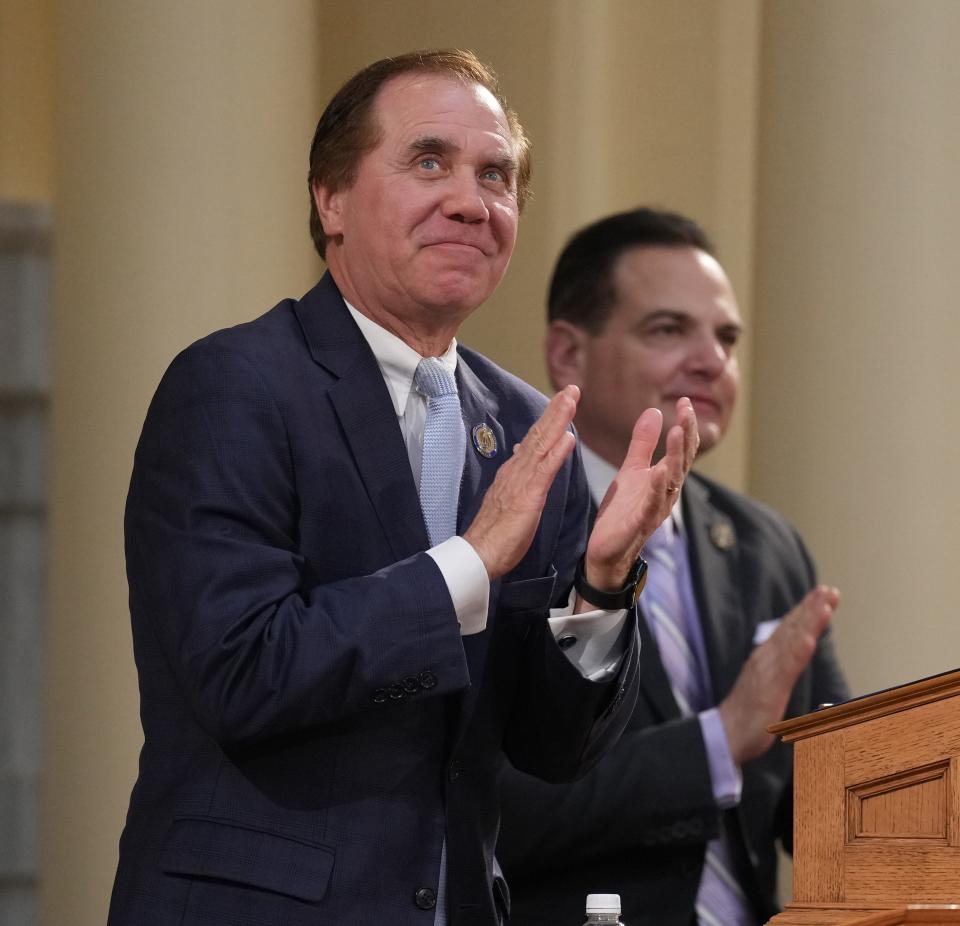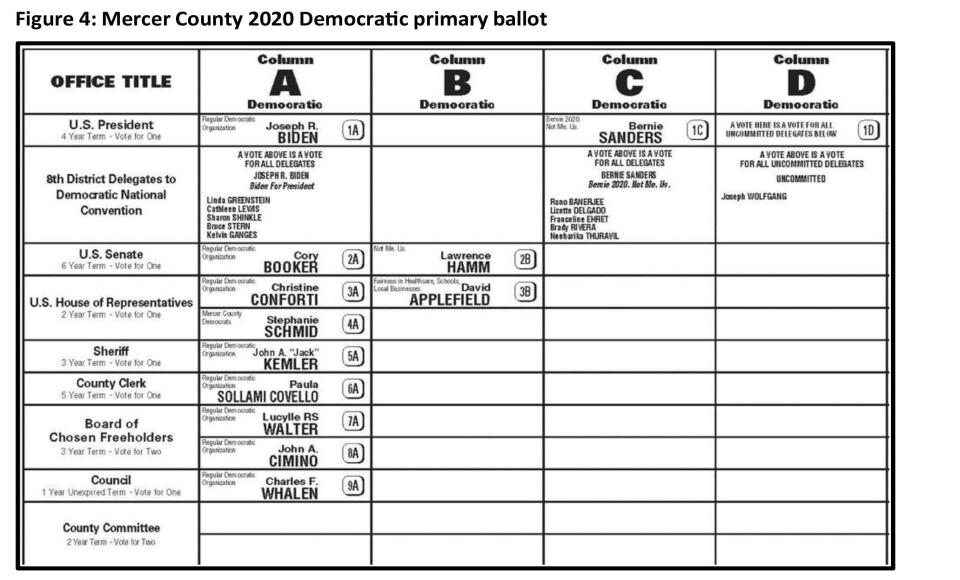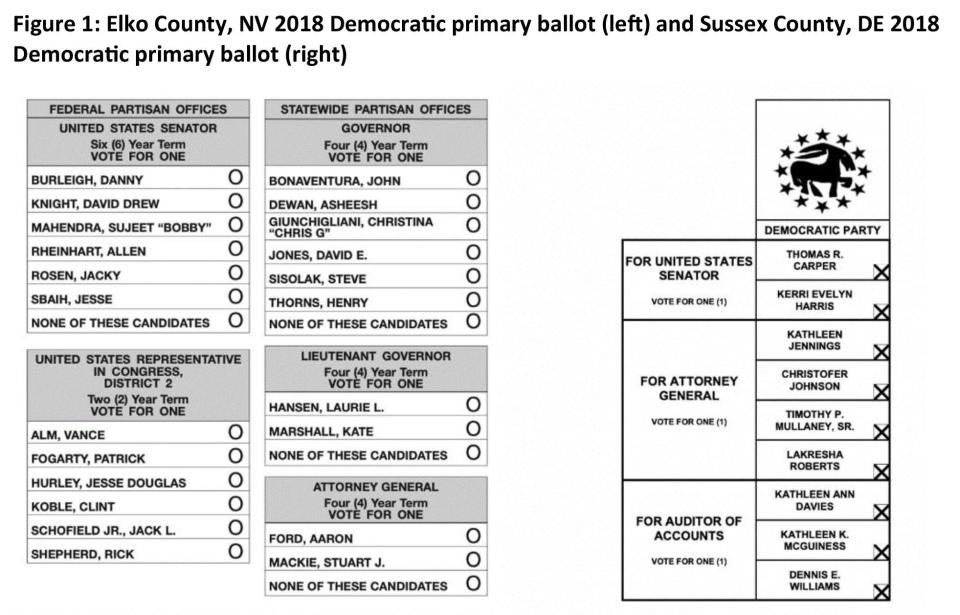Now, the NJ Legislature may tackle the line? That's a hollow pledge | Stile
- Oops!Something went wrong.Please try again later.
- Oops!Something went wrong.Please try again later.
- Oops!Something went wrong.Please try again later.
As the walls of the political clubhouse begin to crumble, leaders of the New Jersey Legislature suddenly have found religion and are willing to explore reforms.
Lawmakers issued a rare, bipartisan communiqué late Tuesday acknowledging — albeit grudgingly — that they are now “committed to a public process” that will study the redesign of New Jersey's primary ballot.
In other words, they may be willing to ditch the county line, an undemocratic, Tammany Hall ballot format that is used in 19 of 21 counties and has been wielded by county leaders and bosses for decades.
Now that the line faces a threat in federal court and a furious backlash on the U.S. Senate campaign trail, the four leaders from the two parties felt it was time to calm everyone’s nerves. They are on the case. Everyone can now take a breather.
“As many involved in the legal process have pointed out, there is longstanding precedent that the Legislature has the authority to determine the law regarding ballot design and the appropriate discretion used by county clerks," they wrote. “Accordingly, the proper authority to consider modifications is the Legislature.”

Their joint missive concluded with: “We are prepared to work in a bipartisan manner to ensure public trust in a transparent and democratic process in New Jersey.”
Trenton hits the panic button — at least to buy time
In truth, this really isn’t a commitment to reform. This is lawmakers hitting the panic button.
This is a late-in-the-game plea from the cheap seats, an attempt to sidetrack the federal case that could strike a death blow to the county line, or what the late Middlesex County Assemblyman David Schwartz called “the benediction of the backroom.”
And in a wider sense, the implications of the lawsuit — aired out in a nine-hour marathon hearing before U.S. District Judge Zahid Quraishi in Trenton on Monday — go far beyond the debate over ballot design. They threaten the whole sclerotic political infrastructure that makes New Jersey a national outlier and embarrassment.

All of New Jersey's boss power and patronage and the institutionalized, pay-to-play corruption flows through the county line. And now there is a distinct possibility that it faces extinction.
As a result, we now have this phony eleventh-hour pledge to make things right, offering Quraishi a way out of a difficult choice with little time left to make it. The subtext of the letter could easily be read this way: “Put down the pen, Your Honor. We got this one. No need to strike down the line. We have heard the cries for change, and we’re ready to act. If you’re going to set the stage for legislative remedy, well, we already got the jump on it.”
Let’s be clear: It's a stalling tactic, a subterfuge aimed at buying time, that will probably do more to annoy than inform Quraishi, who derided another last-minute letter, from Attorney General Matt Platkin, declaring that he would not defend New Jersey's ballot design in court. And that's assuming the judge will even bother considering it. He has enough on his desk with the primary just 2½ months away.
And as pledges go, its a pretty hollow one.
Legislators from both parties have no credibility when it comes to reforming the governmental and political systems that allow them to amass power and profit. They have a habit of tweaking those laws to strengthen their power, not weaken it or make the process more fair.
It was only a week ago that the majority-rule Democrats put on a public clinic of arrogance and hubris by trying to ram through a gutting of the Open Public Records Act, the law that gives the public and the press access to the inner workings of government.
They put on the brakes only when a coalition of civic and social justice advocates, progressive activists and union officials — many of the same people pushing for an end to the county line — raised a ruckus.
These are the same leaders who last year pushed through the Elections Transparency Act, an Orwellian-themed law that allowed them to raise enormous sums of money and created new “housekeeping” accounts to bank it.
It’s also the same Legislature that refused to create a panel, armed with subpoena power, to investigate the 200 deaths of veterans at state-run nursing homes during the COVID-19 pandemic. They slow-walked that one around a couple of important election cycles.
Are those who benefited from the line really willing to change it?

The plea to reform is also couched in a much wider context of implausibility. Why should we believe that legislators whose careers benefited from being bracketed with other candidates on the primary ballot would be willing to change it? Their county leaders and political benefactors back home are hardly eager to alter the system. There are simply too many machine-raised foxes guarding the henhouse on this one.
That's not to say there aren't some lawmakers willing to embrace change. State Sen. Troy Singleton, the most powerful Burlington County Democrat, has signed on to a bill by Sen. Shirley Turner, the Mercer County veteran, calling for abolishing the line. Jersey City Mayor Steve Fulop, who is running for governor next year, has called for its demise.
Democratic U.S. Rep. Mikie Sherrill, a likely rival for governor in 2025, has endorsed the concept of replacing the line with a “block ballot," in which all candidates for a specific office are grouped together on the ballot instead of bracketed in the line system.

Yet there is resistance. Gov. Phil Murphy gave a general defense of the line system and offered only a halfhearted blessing to the lawmakers' call for reform when asked by reporters Wednesday.
“I've thought it [the line] served us well over the years. Am I open-minded to tweaks? Absolutely. I've always been," he said.
Murphy has every reason to remain invested in the old-guard method of bracketing endorsed candidates in one column, a method that critics say leaves challengers scattered elsewhere on the ballot with little to no chance of winning. Candidates lucky enough to be granted the line almost always win.
His wife, Tammy Murphy, entered the race to succeed the indicted Sen. Bob Menendez in November, and within weeks, she won the endorsements of leaders in most of the counties with the largest numbers of registered Democratic voters, who will choose the party’s nominee on June 4.
Those endorsements in Hudson, Essex, Bergen, Passaic, Middlesex, Camden and Union led to Murphy's winning the preferential ballot bracketing on the line in those counties. It instantly made her the front-runner, even though she has never held elected office and remained a Republican voter and donor until 2014.
Grassroots activists called it an exercise in rank nepotism — a political neophyte with a thin resume coasting on the power of her husband’s position.
Her chief opponent, Andy Kim, a three-term congressman from Burlington County, harnessed that anger and filed a lawsuit blasting the line-bracketing model as unconstitutional and calling for it to be replaced by the block method, which is used in every other state. It was Kim’s lawsuit that was the subject of Monday’s hearing before Quraishi.
More Charlie Stile: NJ's Democratic Senate primary chaos went to federal court Monday. What's next?
Crunch time for Tammy Murphy
The call to abolish the line has become the centerpiece of Kim's revenge-of-the-nerds campaign, and it has succeeded in stirring the grassroots party activists to his cause — when they are given the chance to vote for it.
He has won nine county endorsement conventions where county committee members can vote in private, while losing in counties where the conventions are closed or the line has already been decided by the chairman or a high council of leaders. Those are Murphy counties.

But if Quraishi grants Kim a preliminary injunction and forces county clerks to swap out the old system for something new in time for the primary, it would be devastating for Tammy Murphy, who trailed by 12 points in one major independent poll. Overnight, Kim would go from underdog to front-runner. It would give him a level playing field in those North Jersey counties that circled the wagons for Murphy.
Quraishi may take weeks to issue a ruling, and he may very well leave the system in place, although he gave several indications that he is not impressed with arguments that tradition should prevail.
“The argument that ‘this is how we’ve always done it, so this is how it should be’ is not going to convince this court,” he said at one point during the hearing.
So it's crunch time for Tammy Murphy, whose campaign was built on the expectation that the way “we’ve always done it” would carry her to the nomination — and likely into the U.S. Senate.
On Tuesday, the governor was on Instagram touting the “March Madness” college basketball bonanza. But the popular tournament bracketing should be the least of his concerns.
He needs to worry about whether his wife will remain bracketed with local candidates in the big Democratic-rich counties.
She probably won't be able to move to the next round without it.
Charlie Stile is a veteran New Jersey political columnist. For unlimited access to his unique insights into New Jersey’s political power structure and his powerful watchdog work, please subscribe or activate your digital account today.
Email: stile@northjersey.com
This article originally appeared on NorthJersey.com: NJ Legislature to consider redesigning ballots to end the line?

